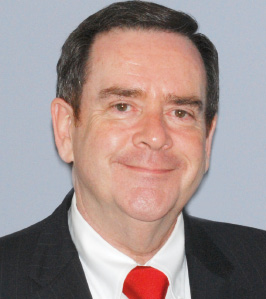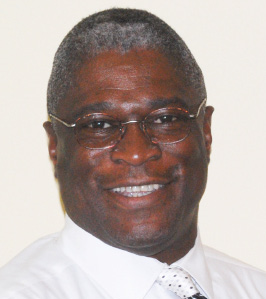
By Leslie Collins
Northeast News
March 16, 2011
Mike Burke and Sly James didn’t skirt around the issues when Northeast News interviewed them about their aspirations for Kansas City.
Each mayoral candidate refrained from negative antics, concentrating solely on how to solve Kansas City’s challenges.
Asked for their opinion on Kansas City’s 1 percent earnings tax, both called it a “fair tax” and voiced approval.
“The city’s earnings tax is probably the fairest tax we have,” James said.
Kansas City’s population increases by one-third every work day through commuters, James said, and that increased traffic creates potholes and generates trash. Commuters expect to use the city’s services like police and fire departments and use the city’s amenities like the Country Club Plaza, sports stadiums, Nelson-Atkins Museum, among others, he said. Those expectations add a burden to the city, he said.
“It’s only fair they should help pay for those services,” James said. “Because this tax is shared by people both in and outside of the city, it would be an impossible tax to replace.”
Burke stressed the tax is only imposed on people who earn a living and doesn’t tax retirement, pensions or the unemployed.
Close to 50 percent of the tax is paid by people who live outside the city, but use the city’s services on a daily basis, he said.
“In that sense, it’s a very fair tax,” Burke said.
Asked how he would balance the city’s budget if voters don’t vote to renew the tax on April 5, Burke said, “It’s not a pretty picture.”
“We would lose $20 million each year for 10 years until it goes away entirely,” he said.
He noted several options for balancing the budget, including a reduction in services, hiring freeze, future layoffs and fee increases.
Possible fee increases would be implemented on trash services, community centers and golfing, among others.
Services across the board would suffer, he said.
“You’re looking at a drastic reduction in services or going back to the voters with some different form of tax,” he said.
James said Kansas City would most likely survive without cutting jobs the first year, but following years would require an increase in fees for trash services and others and cutting “collateral funding” for entities like the Kansas City Zoo, Liberty Memorial and other areas that aren’t “basic essential services.”
Kansas City would realize the most savings from cutting city personnel and/or their benefits, he said.
“The majority of any businesses’ budget has to deal with personnel and benefits, and that’s no different with the city,” he said.
Since the tax funds 40 percent of the city’s General Fund, that revenue loss would negatively impact both the citizens of Kansas City and those who depend on city employees, he added.
On the move
AMC headquarters isn’t the first business to consider relocating from Kansas City to Kansas. Earlier, Kansas City lost the Kansas City Wizards, now Sporting KC, to Kansas, among other vital businesses. Asked what Kansas City can do to attract and retain businesses, Burke listed several ideas, including gaining more incentives from the State of Missouri.
“We’re facing a crisis right now because Kansas has a program called PEAK (Promoting Employment Across Kansas),” Burke said.
That program, he continued, allows Kansas to write a check to businesses as an incentive to relocate to Kansas. That check equals 95 percent of an employer’s Kansas state income tax for its employees over a 10-year period, he said. It’s a forgivable loan if the business remains in Kansas for at least 10 years.
“We can’t compete with that,” Burke said. “I compare it to the “Indiana Jones” movie where Indiana says, ‘Never bring a knife to a gun fight,’ and unfortunately, we’re the guys with the knife and they’re (Kansas) the ones with the gun in their hand.
“We need some help from Jefferson City to have a program that can compete.”
James reflected Burke’s sentiment.
“We need tools from the State of Missouri in order to compete on that level, and until we get those tools, we’re really at a severe disadvantage to Kansas,” James said.
Both James and Burke said things must be streamlined at City Hall to attract and retain businesses.
“We have to make sure the beauracracies and hindrances at City Hall are cleared up because a lot of businesses simply hate doing business in this city,” James said. “It’s too difficult, it’s too time consuming, it’s too expensive.
“When you have options in Blue Springs, Lees Summit, Overland Park and Olathe that aren’t that far and the systems are well-known, they’re predictable, they’re less expensive and they’re faster, why go the hard way when you can go the easier way? We have to become competitive on that level and stop making it hard for businesses to do business.”
James said Kansas City must be proactive and not wait until the last minute to entice businesses like AMC headquarters to stay in Kansas City. Kansas City must partner with businesses a year to two years in advance of a lease expiring and work with businesses to keep them in Kansas City.
Burke said the mayor needs to be the “No. 1 business getter” for the city. Burke, who’s a development lawyer and has served on five economic committees for Kansas City, will use his background to negotiate the “best deals” for Kansas City, he said.
Highlighting the quality of life in Kansas City is another way to attract businesses, Burke said, and it begins with keeping the younger generation in Kansas City.
“People in their twenties are our future. People in their twenties with talent are going to attract business to Kansas City,” he said.
Key issues
For Burke, his number one priority is maintaining professionalism at City Hall and strengthening its middle management.
Second is jobs, he said. Kansas City needs to not only attract jobs, but retain them, he stressed. It’s also important to highlight that Kansas City is a “great regional office town,” he said.
James said city government needs to be more efficient and accountable to the public.
To increase efficiency, James wants to implement CitiStat, a data program that addresses the delivery of city services.
CitiStat allows cities to make demonstrable goals and objectives based on data as opposed to subjectivity, he said.
Kansas City needs to stop being divisive and work together, he said.
“We need to tear down walls and get everybody at the dinner table and start talking about what the city’s all about and making plans,” James said. “It’s the difference between hoping for something good and making something good happen.”
(Editor’s note: There’s more to Burke and James, but we couldn’t fit it all in print. To view our web video, check out our YouTube Channel, KCNortheastNews. We ask Burke and James what kind of legacy they want to leave as mayor, what they like about their opponent, the motto they live by and more. We also included lighthearted questions like if they’re a Mac or PC person, their favorite movie and favorite restaurant to eat at in Kansas City).

Top: Mike Burke. Above: Sly James















